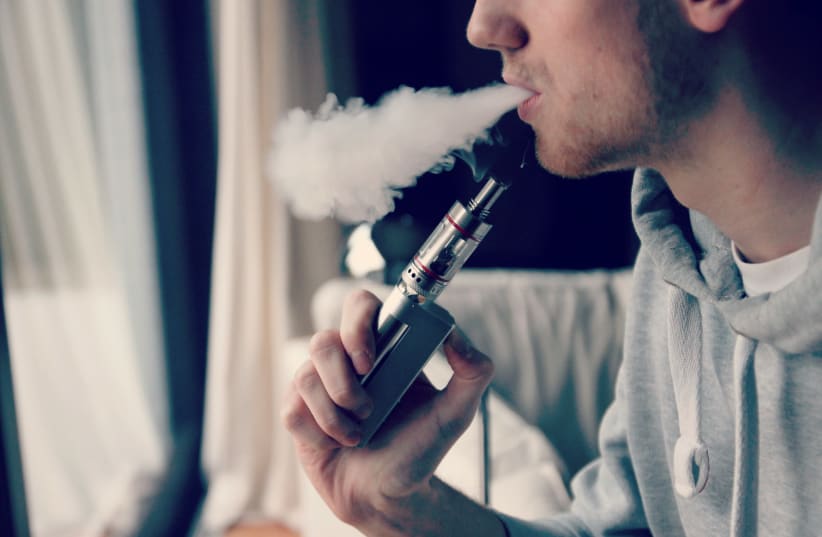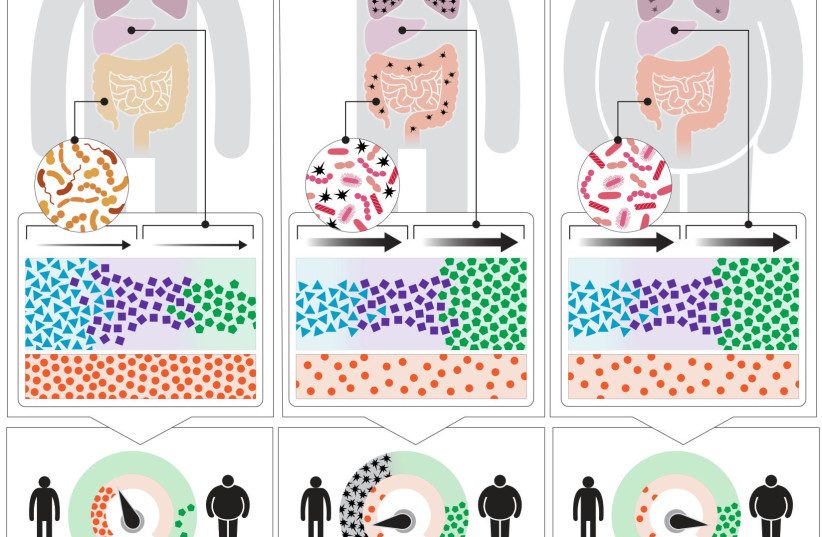Weizmann Institute of Science researchers discovered that obesity, which often develops after people quit smoking, may be driven by specific compounds released by gut microbes (microorganisms) and can therefore be prevented simply by taking antibiotics, according to a new paper published on Wednesday in the prestigious peer-reviewed journal Nature.
The researchers found that mice that were regularly exposed to cigarette smoke failed to gain weight, despite consuming a diet high in fat and sugar. When the smoke exposure stopped, the mice rapidly gained weight, as often happens to humans who quit smoking. But when the mice were given broad-spectrum antibiotics that depleted their microbiome, they gained much less weight after undergoing “smoking cessation,” staying slim for months regardless of their diet. Evidently, smoking-related compounds such as nicotine penetrated the gut of “smoking” mice from the bloodstream, thereby altering the gut’s bacterial composition and, consequently, the body’s metabolism.
The study's findings may be true for humans as well. Hence - according to Prof. Eran Elinav of Weizmann’s Immunology Department, who headed the research team, along with Leviel Fluhr, Uria Mor, and Dr. Hagit Shapiro of Elinav’s lab and additional lab members and other Weizmann scientists - "The compounds we have identified may lead to new treatments that will help people avoid weight gain when quitting smoking. Moreover, these compounds may be further developed into therapies to fight obesity even among nonsmokers.”
Cigarette smoking is considered a leading cause of disease, accounting for over six million deaths each year. Many people don’t quit smoking despite expressing a desire to do so because they are concerned about the substantial weight gain that often accompanies smoking cessation. Until now, the cause of this weight gain was unclear, as studies suggest that most people don’t eat more after quitting smoking.
To confirm that the gut microbes were indeed major regulators of weight gain in the “smoking cessation” mice, the researchers collected microbiomes from “smoking” or “smoking-cessation” mice at various time points and transferred these into germ-free mice that had never been exposed to cigarette smoke. The recipient mice developed microbial imbalances similar to those observed in “smoking” mice and gradually gained weight, a phenomenon that was greatest in mice transplanted with microbiomes collected during the smoking cessation period. Significantly less weight gain occurred when the donor “smoking” mice were treated with antibiotics prior to the transplants.
Next, the researchers identified two small molecules that might explain the metabolic consequences of smoking cessation.
The first, dimethylglycine, or DMG, is a metabolite generated from the dietary nutrient choline by the gut microbiome and the liver. DMG production was enhanced during active exposure to cigarette smoke, but it was substantially reduced when the gut microbiome of “smoking” mice was depleted by antibiotics.
The second bioactive metabolite, acetyl-lysine, or ACG, followed a mirror-image pattern to that of DMG: Its levels were reduced during active exposure to smoke, and after the exposure stopped they increased following antibiotic treatment. When mouse “ex-smokers” (that normally feature low ACG levels) were given an ACG supplement, they failed to gain weight upon “smoking cessation,” suggesting that ACG acted in this context as a weight-reducing metabolite.
After focusing on mice, the researchers finally assessed the microbiomes of 96 smoking and nonsmoking people. They found marked alterations in the microbiome of smokers, as well as microbial metabolite changes that were similar to those found in the mouse “smokers,” including increased levels of DMG and its intermediate products.
“The profound impact that our microbial tenants have on our body never ceases to amaze us,” Elinav said in conclusion. “Our findings shed new light on how the microbiome interacts with the human body in regulating our weight and metabolism, in ways that may be therapeutically exploited.”

